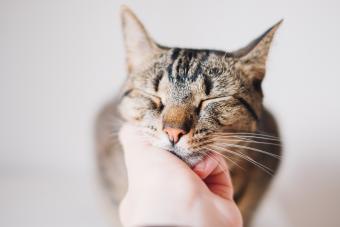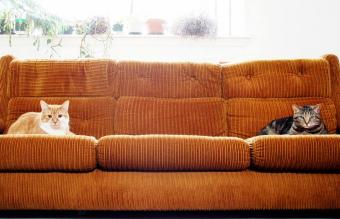
Like us, our cats seem to want to snuggle up on the fluffy fleece blanket next to the fireplace and catch some Zs. With how much they sleep during the rest of the year, it may be difficult to tell if your kitty is sleeping more than normal as winter approaches. Truth be told, there's a list of differences you may notice as your cat's body prepares for the cold months.
Changes in Daylight
Winter brings a shift in daylight hours and temperature, both of which can affect a cat's sleep cycle. As days become shorter and nights grow longer, cats may adjust their activity levels accordingly, leading to increased sleep duration. Since cats are crepuscular creatures that are most active during dawn and dusk, you may notice they're sleeping longer through the night than normal. Probably not a bad thing if your cat is the type that wants food or attention in the warmer months at 3 AM.
Seasonal Depression
You know, it's not just us humans who can feel a bit down when the days get shorter and the weather colder. Our feline friends can experience something similar. Pretty surprising, right? Just like with humans, seasonal changes in dalyight hours can affect cats, leading to changes in their mood and behavior. You might notice your kitty sleeping more, eating less, or seeming less interested in play during the colder months. It's important to pay attention to these changes and do what we can to help our furry pals.
Something as simple as providing extra playtime, using artificial lights, or even just offering some extra cuddles can make a big difference in their winter blues.
Your Kitty Becomes More Affectionate
You might have noticed that as the weather gets chillier, your cat seems to become more affectionate. They might follow you around more, snuggle up next to you on the couch, or curl up in your lap more often than usual. It's not just your imagination. Cats are experts at finding the warmest spots in the house, and often, that's you.
In the winter, when it's cold and drafty, your little fur baby might seek you out for extra cuddles. And let's be real, having a purring cat curled up next to you makes those cold winter evenings so much cozier. A winter's day, a cozy cup of tea, and a cat curled up in your lap are winter goals, after all. Just remember, this is also a great time to return the affection by keeping them warm and comfy and maybe even spoiling them with some extra playtime.
Speaking of warm places, watch for your cat if they're indoor/outdoor, as they may snuggle up to other heat sources like your car motor or near an outdoor fireplace.
How Your Cat's Coat Changes
You know how we bundle up in layers when the weather gets colder? Our feline friends have their own nifty system for keeping warm. As the days get shorter, cats' bodies respond to the reduced amount of daylight by growing a thick, plush winter coat. This natural adaptation helps them retain body heat and stay comfortable as temperatures drop. So, if you've been noticing your cat's fur getting fuller and fluffier as winter sets in, don't worry, it's perfectly normal.
This might also mean more shedding, so get ready to step up your vacuuming game. And remember, always brush your cat's fur regularly to keep it from matting and to help distribute natural oils evenly throughout their coat.
Some Cats Want to Pack On the Pounds

Oh, yes, the winter munchies! We've all been there—even your cat. It's not just us humans who feel like snacking a bit more during the colder months. Some cats also have a tendency to eat more in winter.
You know how you burn more calories when you're cold, and your body seems to crave hearty, warming foods? Cats are the same way. They burn more energy trying to stay warm, so they may eat more to compensate. It's a survival instinct. And don't we all appreciate a bit of extra fuel when we're facing a chilly day?
That being said, it's important to keep an eye on your kitty's waistline. While a little seasonal weight gain is generally fine, too much can lead to obesity. We want our cats to be content but still fit through the cat door come springtime.
Keep Your Cat Happy and Healthy
Helping your cat cope with the winter involves a few key strategies to keep them comfortable, engaged, and healthy. Here's how you can assist your cat:
- Maintain a warm environment: Cats are heat seekers, so make sure they have a warm place to rest. A heated bed or a blanket can be a great addition to their favorite nap spot.
- Light therapy: Shorter days can affect your cat's mood and behavior. Consider using pet-safe artificial lights to mimic longer daylight hours. This could help combat potential seasonal depression in your cat.
- Provide plenty of exercise and enrichment: Indoor play and exercise become especially important in the winter months when cats are less likely to venture outside. Make time for play sessions and consider introducing new toys to keep your cat mentally stimulated.
- Monitor food intake: Some cats might eat more in winter to generate body heat, while others might eat less due to decreased activity. Monitor your cat's eating habits and adjust portion sizes if necessary, keeping their weight in check.
If your cat has fallen in love with the heating blanket and you leave it on for hours at a time, make sure you check regularly that it's not too hot and is still working normally.
Observing Your Kitty During the Winter Months
Understanding the reasons behind a cat's increased sleep during the winter months can help you ensure your furry friend stays comfortable and healthy throughout the season. Remember to provide plenty of warm and cozy sleep spots, maintain regular feeding times, and continue engaging your cat in stimulating play. While a little extra winter slumber is normal, always keep an eye out for any dramatic shifts in behavior or habits.







